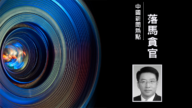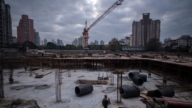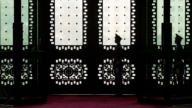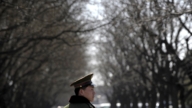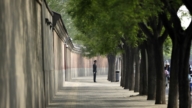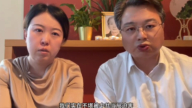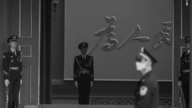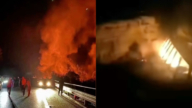【新唐人2013年12月14日訊】總部位於美國華盛頓的「全球金融誠信機構」(GFI),研究55個發展中國家有關「黑錢外流」的情況,結果顯示:2002年至2011年,近十年期間,中國外流的「黑錢」,累計超過1萬億美元,約佔全球總額的六分之一,位居世界「贓款外流」的榜首。而這些外流的黑錢,據了解,多是不義之財。
美國《新聞週刊》12月11號報導,「全球金融誠信機構」研究發現,2002年至2011年近10年間,55個發展中國家外流的黑錢,總額高達5萬9000億美元,其中中國為1萬億美元以上,約佔黑錢外流總額的六分之一,位居榜首。
研究指出,黑錢流動往往與犯罪、貪污、賄賂、洗錢、回扣和逃稅有關。最常使用的方法是在外匯單上造假,也就是在出口或進口中,漏報或多報產品的真正價值。10年進出口偽報貨價的數額,大約佔黑錢總額的8成。
「全球金融誠信機構」的總裁雷蒙德•貝克(Raymond Baker)強調:「我們或許都低估了中國與香港之間的問題,情況很糟糕。」
他表示,「國際貨幣基金」組織的貿易數據,範圍僅限於商品貿易,而不包括服務貿易,因此很難確定中國和香港之間的黑錢流動問題,另外數據中還不包括穆斯林國家非正規銀行系統現金流動的數據。
大陸經濟學專家楊彬指出,中國外流的黑錢多是不義之財。
大陸經濟學專家楊彬:「有錢的人跟高官跟富豪,連人帶錢往外轉移的特別多,這個是現狀,另外的是國企的這種流失,大的企業國企跟他們做生意的,跟國外他有生意,這生意恐怕這裏面都有黑錢在裏面,以權謀私,國家虧了一個億,你讓國家虧十個億,可以做到吧,然後這個錢流到國外了。」
11月下旬,《維基解密》曝光:中共官員在瑞士銀行「UBS」有5,000多個人賬戶,而香港是高層官員洗錢的主要地點。中共每個派別都有自己的銀行和操盤手。
日前遭中共司法調查的「石油幫」老大—-前中共政法委書記周永康,他被曝光的海外帳戶,僅在加拿大,就有2000萬美元的存款。
而周永康的嫡系,9月剛落馬的前中共國資委主任,「中石油」前董事長蔣潔敏,也被揭露利用油田收購、採購設備等重大項目,幫周的家族洗錢高達百億美元,周家再轉存瑞士、美國、加拿大等各國銀行。
2002年12月9號,「國際清算銀行」發佈例行報告,報告中提出:「中資銀行(一家或數家)轉移了30多億美元的資金,到它們位於加勒比海地區的分支機構。」
而「中國銀行」只承認轉移了30多億美元中的10億美元。那麼,誰轉移了剩下的20億美元?
前「中國銀行」香港副董事長兼總裁劉金寶,於2003年5月20號在深圳被捕。他披露,前中共黨魁江澤民在2002年「十六大」之前,一次挪出200多億人民幣。
中國資深法學專家趙遠明:「他這錢來路不正,而且很多好比高官都是收受賄賂這些錢,大批的錢都沒有明確出處,那麼他只好往國外匯,第一是保證這個錢不出問題,第二掩蓋自己的受賄犯罪的這種事實。」
2011年「中國人民銀行」曾公布一項機密調研結果:從上世紀90年代中期以來,中共外逃黨政幹部和失蹤人員數目,高達16000至18000人,而他們攜帶外逃的款項達8000億元人民幣。
中國資深法學專家趙遠明:「鄧小平讓一部份人先富起來,這一部份人就是太子黨這類人,他們富因為他(們)不是靠自己的能力,而是靠權利。中國的富豪,真正的是靠自己的才華本事發起來,不是特別多。所以說,一旦中國政局不穩,或者是怎麼樣的政治運動一來,他們(貪官)就開始擔心。」
中國資深法學專家趙遠明指出,中共貪官和富豪對中共體制沒信心,怕人財兩空,他們把國外當作儲存財產的「保險櫃」,而把中國當作撈錢的「金礦」。
採訪編輯/李韻 後製/李智遠
China Tops Dirty Money Outflow
According to Global Financial Integrity, a Washington, D.C.-
based research organization, the study found that the total
amount of tainted money to have leached out of 55 developing
countries to be over $5.9 trillion between 2002 and 2011.
China tops the list, at just over $1 trillion, or nearly a
sixth of total global hemorrhaged assets,
to Russia’s cumulative $881 billion.
The outflowing cash is mostly associated
with illegal activities.
Newsweek reported on 11th December, according to GFI’s
study, the total amount of tainted money to have leached
out of 55 developing countries to be over $5.9 trillion
between 2002 and 2011.
China tops the list, at just over $1 trillion,
or nearly a sixth of total of global hemorrhaged assets.
Research indicated that the flow of tainted money, linked to
crime, corruption, bribery, money laundering,
kickbacks and tax evasion.
By far the biggest driver of tainted money is something
called trade misinvoicing — the underreporting or
overreporting of the true value of goods or
services sold or acquired abroad.
The misinvoicing accounted for nearly 80 percent of
illicit flows from 2002 through to 2011.
Raymond Baker, the president of GFI, told Newsweek:
We may well underestimate what’s going on between
China and Hong Kong — it’s murky.
Baker notes that IMF trade data covers misinvoicing only
for merchandise trade, not service trade, and that figuring
out illicit flows between China and Hong Kong is difficult.
GFI』s figures also do not account for hawala transactions,
an informal banking system common in Muslim countries.
Economist Yang Bin indicates the cash outflow
from China is mostly illegal.
Eeconomist, Yang Bin: It is common in China that those who
are wealthy and at the official rankings
transfer money overseas.
There are also outflows from the state owned enterprises (SOE).
Business with SOE (state owned enterprises) will mostly
involve tainted money.
They abuse the power to seek personal wealth.
If the state loses 100 million yuan, they can leave it as a loss of
ten times the amonout of 100 million yuan.
The difference in money can easily flow overseas.
In late November, Wikileaks reported that Chinese
government officials hold about 5,000 personal Swiss bank
accounts with the Swiss global financial services company UBS.
Hong Kong is a major place for top officials’
international money laundering.
Each faction of the Communist Party (CCP) has its
own bank and dealer.
The former chief of domestic security, Zhou Yongkang,
who is engulfed in a corruption scandal and investigations,
holds a $20 million bank account in Canada, Wikileaks claims.
Zhou Yongkang’s loyalist, Jiang Jiemin, former chairman of
PetroChina, was sacked in September.
He was also found to embezzle over $10 billion through
oil field acquisition and procurement of equipment and
launder the money into Zhou’s bank accounts in
Switzerland, USA, and Canada.
In a quarterly review by Bank for International Settlements
On 9th December, 2002, it was stated: in particular,
Chinese banks transferred over $3 billion to their own offices
in banking centers in the Caribbean.
The “Bank of China" recognized only transactions of just
$1 billion. so, what happened to the remaining $2 billion?
Liu Jinbao, former CEO of Bank of China (Hong Kong) and
vice-chairman of Bank of China, was arrested in Shenzhen
on 20th May, 2003.
He revealed that former CCP leader Jiang Zemin had removed
more than 20 billion RMB in 2002,
prior to the 16th National Congress.
Zhao Yuanming, specialist in legal studies:
None of the money was legal.
A majority of high ranking officials took bribes
from unknown sources.
They have to transfer the money overseas to ensure the money
is secured and to cover their crimes of bribery.
The People’s Bank of China has announced a confidential
survey result in 2011: Since the mid 1990s, there have been
between 16,000 and 18,000 officials and cadres missing
with a total of 800 billion RMB.
Zhao Yuanming, specialist in legal studies: Deng Xiaoping made
a claim to allow some people to get rich first.
Those people are the princelings.
They got rich not because of their abilities, but their power.
Not many tycoons in China gained their wealth through
their true capabilities.
That’s why any political instability or movement
will get them (corrupt officials) worried.
Legal expert Zhao Yuanming says that the corrupt officials
and the rich people in China have no confidence in the CCP.
They lack security for their lives and their money.
They have treated foreign countries as the “safe haven"
and China the “gold mine".
Interview & Edit/LiYun Post-Production/LiZhiyuan


